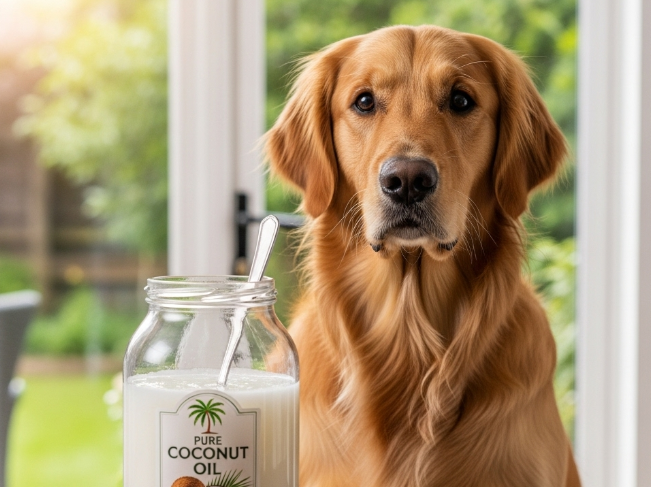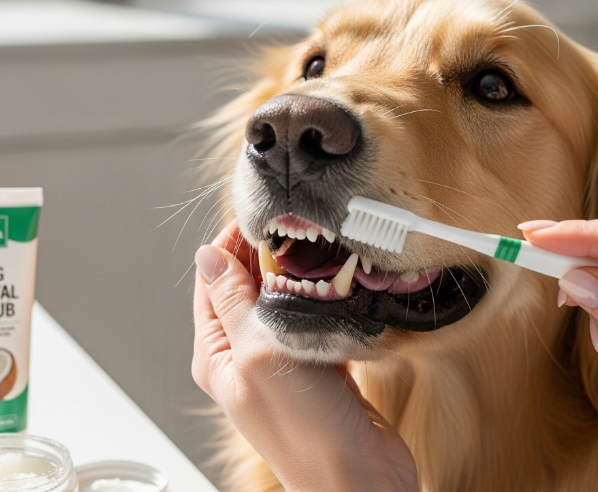Boost your dog’s health with these expert-recommended ways to use coconut oil.

Coconut oil has become a popular natural remedy for both people and pets—and for good reason. When used properly, it may support your dog’s digestion, skin health, immune system, and even dental hygiene. However, it’s important to understand the benefits and risks before adding coconut oil to your dog’s routine.
Here are five safe and effective ways to use coconut oil for your dog.
1. Add Coconut Oil to Your Dog’s Meals
One of the most common ways to use coconut oil for dogs is by mixing it into their food. In small, controlled amounts, coconut oil may help:
- Support thyroid function
- Aid digestion and nutrient absorption
- Reduce inflammation
- Promote healthy weight and energy levels
Thanks to its medium-chain triglycerides (MCTs), coconut oil is quickly metabolized and can provide an energy boost, especially in sedentary or aging dogs. Some studies suggest it may help with digestive disorders like colitis or inflammatory bowel disease.
How Much Coconut Oil to Give Dogs
- Small dogs: Start with ¼ teaspoon daily
- Large dogs: Up to 1 tablespoon, if well tolerated
Always introduce coconut oil gradually, and consult your veterinarian beforehand—especially if your dog is overweight or prone to pancreatitis, as the high fat content could worsen these conditions.
✅ Tip: Choose organic, virgin, cold-pressed coconut oil for best results. Stop using it if your dog shows signs of digestive upset or allergies.
2. Soothe Dry, Itchy Skin With Coconut Oil
Coconut oil works as a natural moisturizer and may relieve dry skin, dandruff, or flakiness, especially during colder months. It may also help improve coat condition, leaving your dog with a soft, shiny coat.
Bonus Benefit: Natural Pest Repellent
When applied topically, coconut oil may also help deter fleas and ticks, acting as a chemical-free alternative for dogs who hike or spend time outdoors.
How to Apply:
- Rub a small amount between your hands and massage into your dog’s skin and coat
- Focus on dry patches, elbows, or paws
- Avoid overuse to prevent greasiness or excessive licking
3. Make Pills Easier to Swallow
If your dog refuses medication hidden in cheese or peanut butter, try using a bit of coconut oil. Its appealing taste and slick texture can help:
- Mask the scent of medication
- Lubricate the pill for easier swallowing
Just dip the pill in a small amount of coconut oil before offering it to your dog.
4. Heal Minor Cuts and Cracked Paws
Coconut oil has antibacterial, antifungal, and antiviral properties, making it a helpful remedy for:
- Minor skin irritations
- Cracked or dry paw pads
- Small scrapes or bug bites
- Irritation from seasonal allergies
Apply a thin layer to the affected area. However, avoid using it on open wounds or infections that are bleeding, oozing, or severe—those require veterinary care.
⚠️ Note: Some dogs may lick the area more after application. Monitor them to prevent excessive licking or chewing.
5. Use Coconut Oil for Dental Health

Coconut oil can help reduce plaque and bacteria in your dog’s mouth, making it a natural option for oral hygiene. It’s often used as a base in DIY dog toothpaste.
How to Use:
- Add a small amount to a toothbrush and brush your dog’s teeth
- Mix it with pet-safe ingredients like baking soda or turmeric (if approved by your vet)
Regular brushing with coconut oil may support fresh breath and healthier gums.
Important Safety Tips
While coconut oil offers many benefits, it’s not suitable for every dog. Keep these precautions in mind:
- Start slow and watch for signs of digestive upset or allergic reactions
- Avoid overuse—too much saturated fat can lead to weight gain or digestive issues
- Never replace medical treatment with coconut oil; always talk to your vet first
Final Thoughts: Is Coconut Oil Good for Dogs?
In moderation and with veterinary guidance, coconut oil can be a safe and beneficial addition to your dog’s routine. From better digestion to healthy skin and even shinier coats, this natural oil has plenty of uses—but it’s not a one-size-fits-all solution.
If you’re considering adding coconut oil to your dog’s diet or care routine, always consult your vet to ensure it’s the right choice for your pet’s specific needs.
